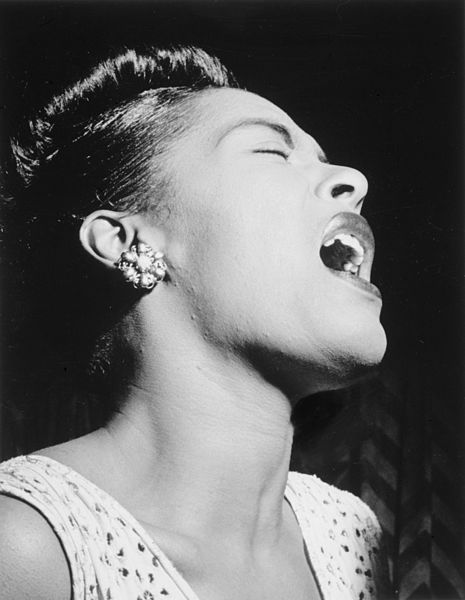 “Strange Fruit” is a song performed most famously by Billie Holiday (lived in Harlem during this time), who first sang and recorded it in 1939. Written by the teacher Abel Meeropol as a poem, it exposed American racism, particularly the lynching of African Americans. Such lynchings had occurred chiefly in the South but also in other regions of the United States. Meeropol set it to music and with his wife and the singer Laura Duncan, performed it as a protest song in New York venues, including Madison Square Garden.
“Strange Fruit” is a song performed most famously by Billie Holiday (lived in Harlem during this time), who first sang and recorded it in 1939. Written by the teacher Abel Meeropol as a poem, it exposed American racism, particularly the lynching of African Americans. Such lynchings had occurred chiefly in the South but also in other regions of the United States. Meeropol set it to music and with his wife and the singer Laura Duncan, performed it as a protest song in New York venues, including Madison Square Garden.
“Strange Fruit” is a poem written by Abel Meeropol, a white, Jewish high school teacher from the Bronx and a member of the Communist Party, as a protest against lynchings. He sometimes published under the pen name Lewis Allan, after two sons who were stillborn.
The lyrics, very similar to those of Théodore de Banville’s poem “Le Verger Du Roi Louis” written seventy years before, are under copyright but have been republished in full in an academic journal, with permission. In the poem, Meeropol expressed his horror at lynchings. He had seen Lawrence Beitler’s photograph of the 1930 lynching of Thomas Shipp and Abram Smith in Marion, Indiana. He published the poem under the title “Bitter Fruit” in 1937 in The New York Teacher, a union magazine. Though Meeropol had often asked others (notably Earl Robinson) to set his poems to music, he set “Strange Fruit” to music himself and the piece gained a certain success as a protest song in and around New York. Meeropol, his wife, and black vocalist Laura Duncan performed it at Madison Square Garden.
 Barney Josephson, the founder of Cafe Society in Greenwich Village, New York’s first integrated nightclub, heard the song and introduced it to Billie Holiday. Other reports say that Robert Gordon, who was directing Billie Holiday’s show at Cafe Society, heard the song at Madison Square Garden and introduced it to her. Holiday first performed the song at Cafe Society in 1939. She said that singing it made her fearful of retaliation but, because its imagery reminded her of her father, she continued to sing the piece making it a regular part of her live performances. Because of the poignancy of the song, Josephson drew up some rules: Holiday would close with it; the waiters would stop all service in advance; the room would be in darkness except for a spotlight on Holiday’s face; and there would be no encore. During the musical introduction, Holiday would stand with her eyes closed, as if she were evoking a prayer.
Barney Josephson, the founder of Cafe Society in Greenwich Village, New York’s first integrated nightclub, heard the song and introduced it to Billie Holiday. Other reports say that Robert Gordon, who was directing Billie Holiday’s show at Cafe Society, heard the song at Madison Square Garden and introduced it to her. Holiday first performed the song at Cafe Society in 1939. She said that singing it made her fearful of retaliation but, because its imagery reminded her of her father, she continued to sing the piece making it a regular part of her live performances. Because of the poignancy of the song, Josephson drew up some rules: Holiday would close with it; the waiters would stop all service in advance; the room would be in darkness except for a spotlight on Holiday’s face; and there would be no encore. During the musical introduction, Holiday would stand with her eyes closed, as if she were evoking a prayer.
Holiday approached her recording label, Columbia, about the song, but the company feared reaction by record retailers in the South, as well as negative reaction from affiliates of its co-owned radio network, CBS. Even John Hammond, Holiday’s producer, refused so she turned to friend Milt Gabler, whose Commodore label produced alternative jazz. Holiday sang “Strange Fruit” for him a cappella, and moved him to tears. Columbia allowed Holiday a one-session release from her contract in order to record it and Frankie Newton’s eight-piece Cafe Society Band was used for the session. Because he was worried that the song was too short, Gabler asked pianist Sonny White to improvise an introduction so that Holiday only starts singing after 70 seconds Gabler worked out a special arrangement with Vocalion Records to record and distribute the song.
She recorded two major sessions at Commodore, one in 1939 and one in 1944. The song was highly regarded and the 1939 record sold a million copies, in time becoming Holiday’s biggest-selling record.
In her autobiography, Lady Sings the Blues, Holiday suggested that she, together with Meeropol, her accompanist Sonny White, and arranger Danny Mendelsohn, set the poem to music. The writers David Margolick and Hilton Als dismissed that claim in their work, Strange Fruit: The Biography of a Song writing that hers was “an account that may set a record for most misinformation per column inch”. When challenged, Holiday—whose autobiography had been ghostwritten by William Dufty —claimed, “I ain’t never read that book.”
Great song, here’s Ms. Holiday:
Become a Harlem Insider!
By submitting this form, you are consenting to receive marketing emails from: . You can revoke your consent to receive emails at any time by using the SafeUnsubscribe® link, found at the bottom of every email. Emails are serviced by Constant Contact









